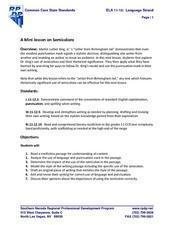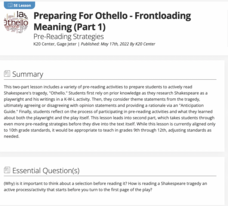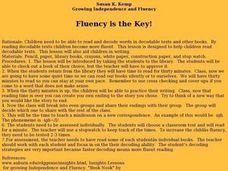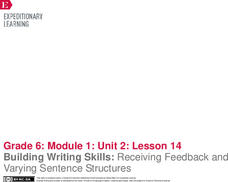Curated OER
Mini-Lesson Planning for Inferences
Making inferences and drawing conclusions is a key component to successful active reading. Encourage your class to use context clues and prior knowledge to infer different elements of a story, including the setting, plot, and character...
iCivics
Mini-Lesson: Presidential Pardons
How do United States presidents give people second chances? Scholars research the concept of presidential forgiveness, or pardon. By completing an Executive Branch Mini-Lesson, class members get a better grasp of the power the executive...
iCivics
Mini-Lesson: Presidential Succession
Who is in line for the presidency? Learners research the line of succession in the executive branch. They analyze the role the cabinet plays in a situation where the president and vice president are not able to serve. Along the way,...
Southern Nevada Regional Professional Development Program
A Mini lesson on Semicolons
Dr. Martin Luther King, Jr.'s "Letter from Birmingham Jail" serves as an exemplar for a mini-instructional activity on semicolons. Working alone or in small groups, class members first circle all the semicolons in the letter, and then...
Apple State University
Friendly Letter Mini-Lesson
This mini-lesson plan about informal letter writing is packed with a lot of information about writing a friendly letter. Class members begin by working in pairs to answer questions after reviewing letter models. Then, take part in a...
Curated OER
Using Social Studies in Five Shared Reading Lessons: Geography
After several short 15-minute mini-lessons, your learners will gain an understanding of the characteristics of a non-fiction text. Using the book Map It by Elspeth Leacock, your class will become acquainted with non-fiction terms such as...
Curated OER
Mini-Lesson: Planning for Inferences
The five lessons in this resource are designed to teach class members how to read between the lines, how to use personal experience/background knowledge/schema, along with the information in the text, to make assumptions about what is...
Student Achievement Partners
"The Glorious Whitewasher" from The Adventures of Tom Sawyer by Mark Twain with Mini-Assessment
It's the classic scene: Tom Sawyer is whitewashing a fence. Expose your learners to Mark Twain's humor while reinforcing reading comprehension. Eighth graders are encouraged to read and reread, achieving as much exposure to the text as...
K20 LEARN
Preparing for Othello - Frontloading Meaning (Part 1): Pre-reading Strategies
The success of any lesson based on a complex text relies heavily on what instructors do before beginning the reading. Before reading Othello, scholars engage in a series of pre-reading activities, including completing an anticipation...
Curated OER
Using Wordless Comics To Help Create Meaning in Reading
Use picture cues as a tool in order to create meaning along with text. With a wordless comic, young illustrators discuss the main idea and character traits, and independently write a summary for a page of a wordless comic. This strategy...
ReadWriteThink
Comics in the Classroom as an Introduction to Narrative Structure
A picture is worth a thousand words, but a comic strip combines both images and words for the ultimate narrative effect. After reading The Three Little Pigs and deciphering the plot elements, elementary readers work through four...
Curated OER
Using the Comprehension Strategies
High school learners review the six major reading comprehension strategies. They demonstrate the strategies by putting them into action using more complex reading. They finish by discussing a seventh strategy, monitoring comprehension.
Pyro Innovations
Reading Comprehension
Good reading practices can start at any age. Early readers work with the teacher to read a short story about a bear. First, they identify basic text features, such as the title, author, and illustrator. Then, they answer several simple...
iCivics
Mini-Lesson: Executive Orders
Can the President of the United States pass a law all by himself? Scholars investigate the concept of the executive order in regards to the powers of the presidency. They use current issues and events to monitor media bias while also...
Curated OER
Religion in Japan Japanese Writing
Study the three writing systems of Japanese: Hiragana, Katakana and Kanji. Your middle schoolers will practice writing Kanji and write a mini story in English which uses at least 10 of the Kanji in the place of the English words....
Curated OER
Fluency is the Key!
A field trip to the library begins this lesson plan where children select their own books to practice fluent silent reading. They then practice their writing by creating a new ending to the story they chose before receiving a mini-lesson...
Workforce Solutions
Workforce Solutions Pre-K Lessons
Four lessons, each following the same routine, explore the careers of a teacher, nurse, electrician, geologist, plumber, and police officer. After listening to a read-aloud and thoughtful discussion, young scholars construct puppets on...
EngageNY
Rereading and Close Reading: Communism, “The Vietnam Wars,” and “Last Respects” (Pages 85 and 86)
What might a papaya symbolize? Using the resource, scholars look for examples of symbolism in the novel Inside Out & Back Again. They also participate in a silent discussion called a Chalk Talk, writing their responses to a...
Curated OER
Lesson Plan 13: Going Deeper Mini-Lesson
November is NaNoWriMo, or National Novel Writing Month! If your class is participating (or simply doing a narrative writing unit), this peer review lesson is part of a larger unit which can be easily found online. Once your writers have...
EngageNY
Building Writing Skills: Receiving Feedback and Varying Sentence Structures
Everyone is good at something. Scholars receive their mid-unit assessments with feedback. They look over their papers and write their strengths as a writer and goals on index cards. The class then has a mini instructional activity in...
EngageNY
Reading Proficiently and Independently: The Power of Setting Goals
Scholars reflect upon their reading strengths and challenges to create personal reading goals. Participants use goal-setting verbiage in an accordion-style graphic organizer, a first step in writing a letter that details their reading...
Curated OER
Combining with Participial Phrases
Combine participial phrases and creative writing with this lesson, which is equally helpful for writing skills and conventions. After a mini-lesson on participial phrases and reading the picture book Dancing in the Wings, pupils use a...
Utah Education Network (UEN)
Character Changes Lesson and iPad Assignment
Round, flat, static, dynamic. As part of a characterization study, scholars review the different types of characters and create a slide show demonstrating how a dynamic character in a story they have read changes throughout the tale.
EngageNY
Writing: Drafting Body Paragraphs and Revising for Language
Begin the drafting phase of the writing process with a lesson plan focused on logically writing three body paragraphs. Then, revise the writing to make it more formal after a teacher-directed mini-lesson plan. Each paragraph highlights...

























